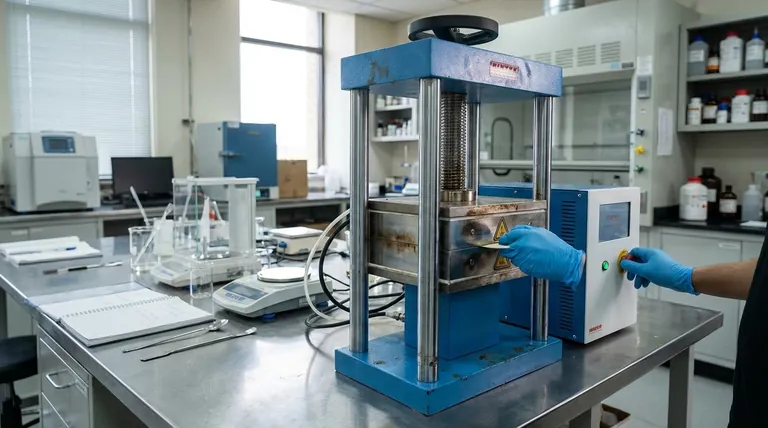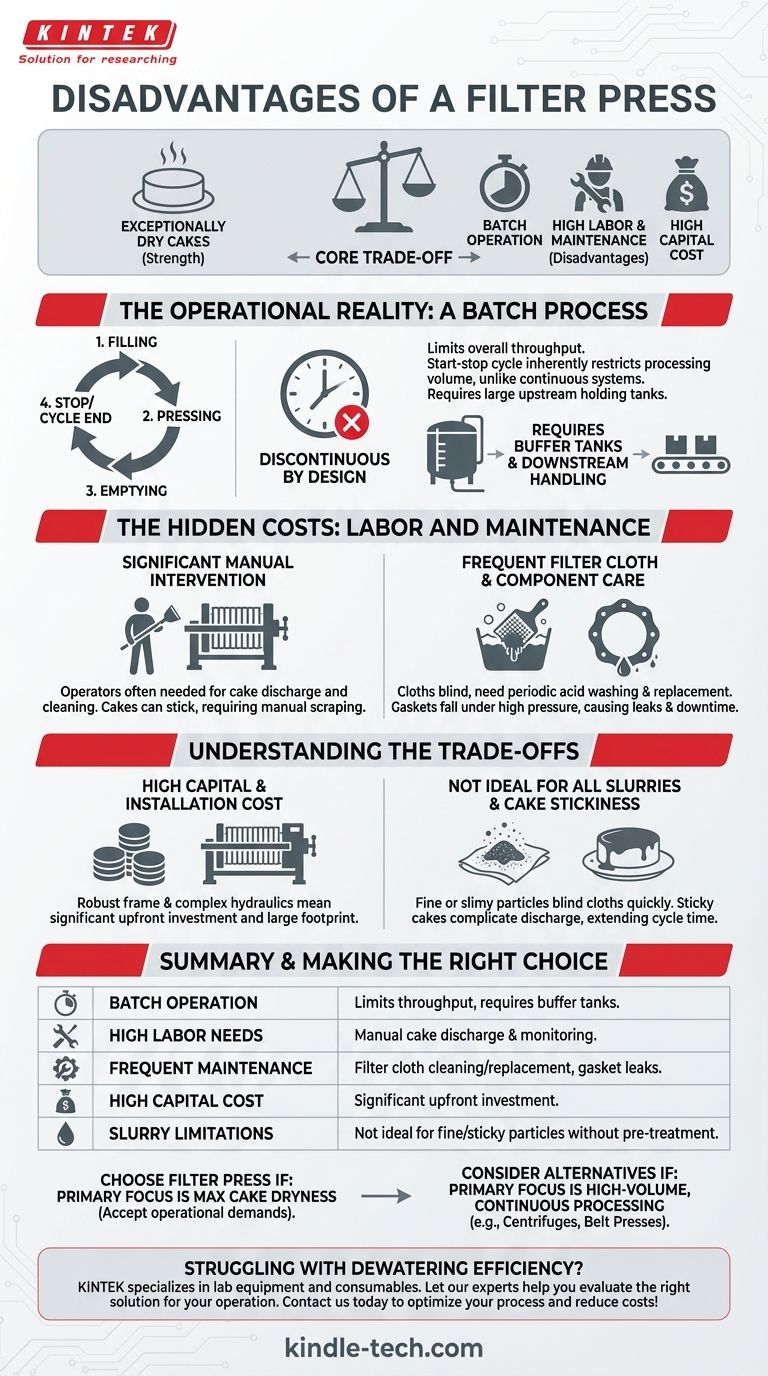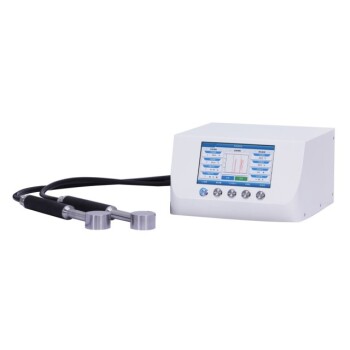While highly effective, the primary disadvantages of a filter press are its batch-style operation, significant labor and maintenance requirements, and relatively high capital cost. Unlike continuous systems, a filter press operates in a start-stop cycle of filling, pressing, and emptying, which limits overall throughput and requires manual oversight.
A filter press excels at producing exceptionally dry solid cakes, but this performance comes at the cost of being a discontinuous, labor-intensive, and maintenance-heavy process. Understanding this core trade-off is critical when evaluating it against other dewatering technologies.

The Operational Reality: A Batch Process
The most fundamental drawback of a filter press is that it does not operate continuously. Its entire design is based on a repetitive cycle, which has significant operational implications.
Discontinuous by Design
A filter press cycle consists of distinct phases: filling the chambers with slurry, pressurizing the slurry to force liquid through the filter cloths, and opening the press to discharge the solid "cakes." This entire sequence must complete before the next batch can begin.
Impact on Throughput
This start-stop nature inherently limits the total volume of slurry that can be processed over a given period. Continuous systems, such as a belt press or centrifuge, can process a constant flow, often making them better suited for very high-volume applications where downtime between batches is unacceptable.
Requires Buffer Tanks
Because the process is intermittent, plants using filter presses typically require large upstream holding tanks to accumulate slurry while the press is in its pressing or discharge cycle. Downstream conveyors or bins are also needed to handle the periodic, large-volume discharge of solid cakes.
The Hidden Costs: Labor and Maintenance
The effectiveness of a filter press is directly tied to its mechanical condition, particularly the state of the filter cloths. This creates unavoidable labor and maintenance demands.
Significant Manual Intervention
Even in semi-automated systems, an operator is often required to monitor the cake discharge. Cakes can stick to the cloths, requiring a manual scraper or spatula to ensure each chamber is fully empty before the next cycle begins. This supervision is a direct labor cost.
Frequent Filter Cloth Maintenance
Filter cloths are the heart of the press, but they are also a primary point of failure and maintenance. They can become "blinded" or clogged with fine particles, requiring periodic washing (often with acids) to restore permeability. Over time, they wear out and must be replaced, a task that is time-consuming and can shut down the operation for hours or days.
High-Pressure Component Wear
The press operates under immense hydraulic pressure. This puts stress on the frame, plates, and particularly the gaskets that seal each chamber. Gasket failures are a common source of leaks, leading to messy conditions, lost product, and necessary downtime for replacement.
Understanding the Trade-offs
No technology is without its compromises. The filter press's weaknesses are the direct inverse of its primary strength: producing extremely dry solids.
High Capital and Installation Cost
Filter presses are heavy-duty, robust machines. The massive steel frame required to withstand high pressing forces and the complex hydraulic system contribute to a significant initial purchase price compared to some other dewatering options. Their large footprint and heavy weight can also increase installation costs.
Not Ideal for All Slurry Types
Slurries containing very fine, slimy, or gelatinous particles can be challenging. These materials can quickly blind the filter cloths, dramatically slowing the filtration rate and leading to wet, difficult-to-handle cakes. In these cases, extensive pre-treatment of the slurry with chemical conditioners is often required.
Cake Stickiness
While a dry cake is usually the goal, an extremely dry or sticky cake can adhere strongly to the filter cloth. This complicates the cake discharge phase, often turning a semi-automated process into a fully manual one and extending the overall cycle time.
Making the Right Choice for Your Operation
Deciding on a filter press requires weighing its superior dewatering capability against its operational demands.
- If your primary focus is achieving the highest possible cake dryness: The filter press is often the superior choice, as its operational drawbacks may be an acceptable trade-off for minimizing final product weight and disposal costs.
- If your primary focus is high-volume, continuous processing: You should strongly evaluate alternative technologies like centrifuges or belt presses that are better suited for uninterrupted, 24/7 operation.
- If your primary focus is minimizing labor and automation: A fully automated filter press can reduce manual intervention but comes at a much higher capital cost and still requires significant, specialized maintenance for its complex components.
Understanding these limitations allows you to accurately weigh the filter press's exceptional dewatering performance against its inherent operational demands.
Summary Table:
| Disadvantage | Key Impact |
|---|---|
| Batch Operation | Limits throughput, requires buffer tanks |
| High Labor Needs | Manual cake discharge and monitoring |
| Frequent Maintenance | Filter cloth cleaning/replacement, gasket leaks |
| High Capital Cost | Significant upfront investment |
| Slurry Limitations | Not ideal for fine, sticky particles without pre-treatment |
Struggling with dewatering efficiency? KINTEK specializes in lab equipment and consumables, offering tailored solutions for your filtration and separation challenges. Our experts can help you evaluate if a filter press is right for your operation or recommend alternative technologies for higher throughput and lower maintenance. Contact us today to optimize your lab's dewatering process and reduce operational costs!
Visual Guide

Related Products
- Laboratory Hydraulic Press Split Electric Lab Pellet Press
- Hydraulic Diaphragm Lab Filter Press for Laboratory Filtration
- Laboratory Hydraulic Press Lab Pellet Press Machine for Glove Box
- Heated Hydraulic Press Machine with Heated Plates for Vacuum Box Laboratory Hot Press
- Heated Hydraulic Press Machine with Heated Plates for Vacuum Box Laboratory Hot Press
People Also Ask
- Why are KBr pellets used in FTIR? Achieve Clear, Accurate Solid Sample Analysis
- Why use KBr for IR? Achieve Clear, Unobstructed Spectra for Solid Samples
- Are hydraulic presses powered by water? Discover the critical role of hydraulic oil.
- What is the use of KBr? Master Sample Prep for Accurate IR Spectroscopy
- What is the advantage of KBr? Unmatched IR Transparency for Precise Spectroscopy



















